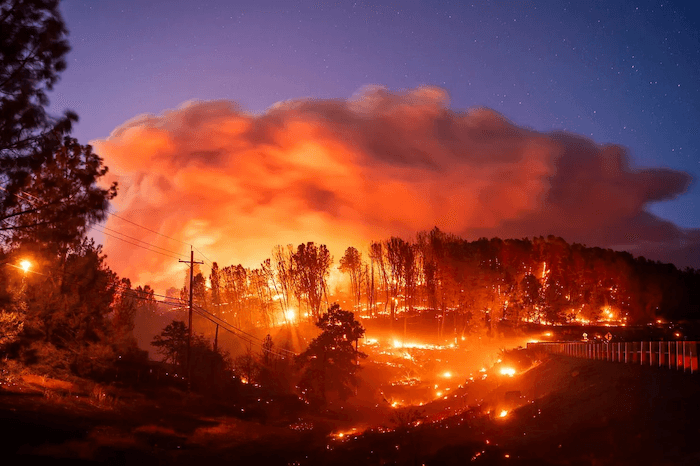California Wildfires and the Corporate Implications of Climate Change
California's wildfires have exposed significant mismanagement by state and city governments, with utility companies like Pacific Gas and Electric (PG&E) facing substantial financial liabilities due to their equipment causing fires, leading to legal challenges and bankruptcy proceedings.
Limbik Team
Jan 17, 2025
Bottom Line
The implications of the wildfires—and of natural disasters and climate crises that will inevitably occur in the future—impact corporations in different ways, across a range of sectors: utilities and energy; real estate; agriculture; tourism and hospitality; retail and logistics and countless others.
The damage to property, homes, businesses, and vehicles is difficult to quantify at this point, with some estimates suggesting the damage could be as high as a quarter of a trillion dollars ($250 billion).
While disinformation may seem like just one pillar of a broader complexity around natural disasters, there are aspects of disinformation that extend to geopolitics and have corporate implications more broadly.
Background
The devastating wildfires in Los Angeles, CA continue to rage, with heartbreaking images flashing nightly on the news and the death toll ticking up and leaving tens of thousands displaced. The implications of the wildfires—and of natural disasters and climate crises that will inevitably occur in the future—impact corporations in different ways, across a range of sectors: utilities and energy; real estate; agriculture; tourism and hospitality; retail and logistics and countless others. Climate change will reverberate across the global economy. Just this week, a top financial watchdog known as the Financial Stability Board, suggested that as climate change-related disasters become more frequent, they will trigger more market panics, some of which could be widely destabilizing.
And as with any major event in the modern era, mis and disinformation typically flood the Internet, distorting people’s viewpoints and, in some cases, leading to some extremely dangerous situations. Fake images, including of the Hollywood sign engulfed in flames, inundated the web, with artificial intelligence (AI)- generated images proliferating on X and TikTok within the first 24 hours after the fires began.
Even the Kremlin, never wanting to waste an opportunity to spread lies and sow discord, jumped into the fray, sharing disinformation and blatant lies that the mansions along the beach burnt to the ground belonged to corrupt Ukrainian military officers. The LA wildfires are also tailor-made for Moscow to begin meddling in, as Russian disinformation will seek to divide Americans, playing into social media posts framing the losses in Los Angeles as part of a socio-economic divide, ‘class wars’ where the damage is downplayed because of the wealth that exists in the area. This overlooks the many middle-class residents impacted by the fires, individuals and families who still need to pay the mortgages they owe to the bank.
Corporate Risks
There are a number of ways in which wildfires and climate-related disasters as a whole will pose a corporate risk. Insurance companies will face a massive increase in claims, and, with them, a rash of disinformation and invective spewed online against the companies and their executives. In the aftermath of the murder of a United Healthcare chief executive officer in New York City in early December, there is a groundswell of vitriol now targeting the CEOs and executive board members of many Fortune 500 countries, which a surprising percentage of Americans sympathetic to the individual responsible for the killing. The damage to property, homes, businesses, and vehicles is difficult to quantify at this point, with some estimates suggesting the damage could be as high as a quarter of a trillion dollars ($250 billion). The average home price in the Pacific Palisades ZIP code is $3.4 million while in Altadena, it’s around $1.3 million.
There will also be rising premiums, especially in areas determined to be ‘high-risk,’ a category that will likely grow to account for more significant swaths of territory likely to be negatively impacted by natural disasters and climate-related emergencies. Utility companies are also coming under increasing scrutiny. In particular, Southern California (SoCal) Edison, the electrical utility for Los Angeles, is facing litigation, recently named in a lawsuit blaming the company for starting one of the massive Los Angeles fires. Property values and real estate will be negatively affected, and there is likely going to be damage to agriculture and food chain supply disruption. Other industries, such as tourism and hospitality, impacted by event cancellations and worried travelers, will suffer in the immediate term. Data centers in high-risk zones will also prompt serious concern and could have second and third-order effects that touch upon other industries and sectors.
There could be some opportunities, however, with an increase in demand for fireproof or fire-resistant construction and building materials.
Implications
While disinformation may seem like just one pillar of a broader complexity around natural disasters, there are aspects of disinformation that extend to geopolitics and have corporate implications more broadly. For example, shortly after the blazes began tearing through Los Angeles, there were accusations that this was the direct result of diversity, equity, and inclusion (DEI) initiatives. Elon Musk got things started by sharing screenshots of the Los Angeles Fire Department (LAFD) “racial equity action plan” from four years ago, stating to his nearly 213 million followers on X, “They prioritized DEI over saving lives and homes.”
After a disaster, the size and scope of what is happening in Los Angeles, there are clear implications for corporations and their employees. Many have been forced to evacuate, unable to work as they huddle with their families in shelters. Those who work in professions such as landscaping, teaching at school, or providing healthcare services will also be out of work for the foreseeable future. As reported by the New York Times, the total number of hours worked in Malibu and the Pacific Palisades declined by 57 percent, according to Homebase, an operations platform for small businesses.
In terms of job losses, the Labor Department’s employment report for January could see between 15,000 and 25,000 fewer positions. The environmental damage is also devastating and will be compounded by the economic challenges, including across manufacturing, higher education, and technology industries, with the most long-lasting impacts likely felt by leisure and hospitality.





